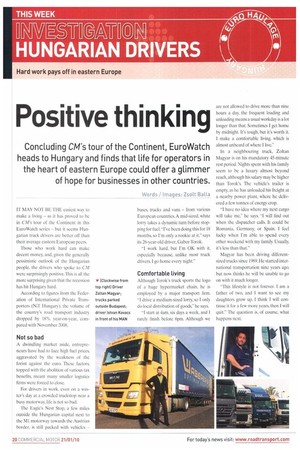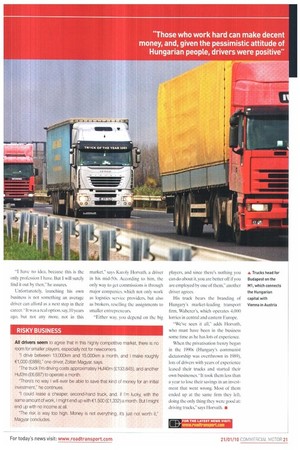Positive thinking
Page 20

Page 21

If you've noticed an error in this article please click here to report it so we can fix it.
Concluding CM's tour of the Continent, EuroWatch heads to Hungary and finds that life for operators in the heart of eastern Europe could offer a glimmer of hope for businesses in other countries.
Words / Images: Zsolt Balla IT MAY NOT BE THE easiest way to make a living as it has proved to be in CM's tour of the Continent in this Euro Watch series but it seems Hungarian truck drivers are better off than their average eastern European peers.
Those who work hard can make decent money, and, given the generally pessimistic outlook of the Hungarian people, the drivers who spoke to CM were surprisingly positive. This is all the more surprising given that the recession has hit El ungary hard.
According to figures from the Federation of International Private Transporters (NiT Hungary). the volume of the country's road transport industry dropped by 18% year-on-year, compared with November 2008.
Not so bad A dwindling market aside, entrepreneurs have had to face high fuel prices, aggravated by the weakness of the forint against the euro. These factors. topped with the abolition of various tax benefits, meant many smaller logistics firms were forced to close.
For drivers in work, even on a winter's day at a crowded truckstop near a busy motorway, life is not so bad.
The Eagle's Nest Stop, a few miles outside the Hungarian capital next to the MI motorway towards the Austrian border, is still packed with vehicles buses, trucks and vans from various European countries. A mid-sized, white lorry takes a dynamic turn before stopping for fuel. -I've been doing this for 18 months, so I'm only a rookie at it,says its 26-year-old driver, Gabor Torok.
"I work hard, but I'm OK with it, especially because, unlike most truck drivers. I go home every night."
Comfortable living Although Torok's truck sports the logo of a huge hypermarket chain, he is employed by a major transport firm. "I drive a medium-sized lorry, so I only do local distribution of goods." he says.
start at 4am, six days a week, and I rarely finish before Opm. Although we are not allowed to drive more than nine hours a day, the frequent loading and unloading means a usual workday is a lot longer than that. Sometimes I get home by midnight. It's tough, but it's worth it. I make a comfortable living, which is almost unheard of where I live."
In a neighbouring truck, Zoltan Magyar is on his mandatory 45-minute rest period. Nights spent with his family seem to be a luxury almost beyond reach, although his salary may be higher than Torok's. The vehicle's trailer is empty, as he has unloaded his freight at a nearby power plant, where he delivered a few tonnes of energy crop.
have no idea where my next cargo will take me." he says, "I will find out when the dispatcher calls. It could be Romania, Germany, or Spain. I feel lucky when I'm able to spend every other weekend with my family. Usually, it's less than that."
Magyar has been driving differentsized trucks since 1989. He started international transportation nine years ago, but now thinks he will be unable to go on with it much longer.
-This lifestyle is not forever. I am a father of two, and I want to see my daughters grow up. I think I will continue it for a few more years, then I will quit." The question is, of course, what happens next.
"I have no idea, because this is the only profession I have. But I will surely find it out by then," he assures.
Unfortunately, launching his own business is not something an average driver can afford as a next step in their career. -It was a real option.say, 10 years ago, but not any more, not in this
market," says Karoly Horvath, a driver in his mid-50s. According to him, the only way to get commissions is through major companies, which not only work as logistics service providers, but also as brokers, reselling the assignments to smaller entrepreneurs.
"Either way. you depend on the big players, and since there's nothing you can do about it, you are better off if you are employed by one of them," another driver agrees.
His truck bears the branding of Hungary's market-leading transport firm. Waberces, which operates 4,000 lorries in central and eastern Europe.
"We've seen it all," adds Horvath, who must have been in the business some time as he has lots of experience.
When the privatisation frenzy began in the 1990s (Hungary's communist dictatorship was overthrown in 1989), lots of drivers with years of experience leased their trucks and started their own businesses. "It took them less than a year to lose their savings in an investment that went wrong. Most of them ended up at the same firm they left, doing the only thing they were good at: driving trucks," says Horvath. •
'Me FOR THE LATEST NEWS VISIT: uvvvvitroadtranspartcom




































































































































